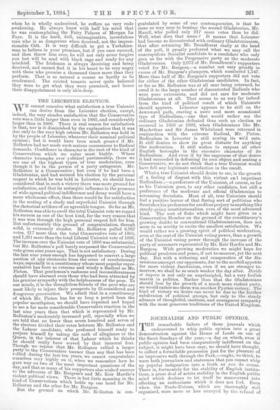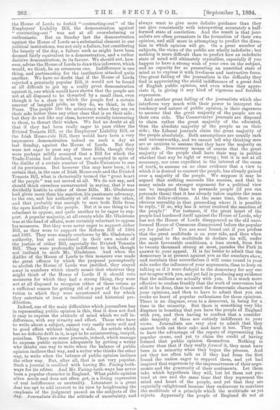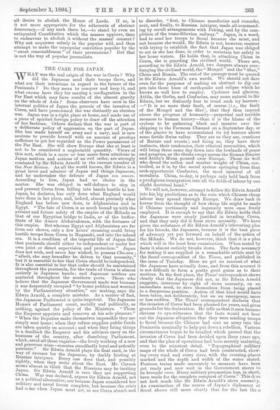JOURNALISM AND PUBLIC OPINION. the House. of Lords to forbid
" contracting-out " of the Employers' Liability Bill, the demonstration against 44 contracting-out " was not at all overwhelming or enthusiastic. But on Sunday last the demonstration against the House of Lords as a substantial element in our political institutions, was not only a failure, but considering the beauty of the day, a failure such as might have been deemed fairly equivalent to a demonstration, and a rather decisive demonstration, in its favour. We should not, how- ever, advise the House of Lords to draw this inference, which would, we think, be an erroneous one. Indifference is one thing, and partisanship for the institution attacked quite another. We have no doubt that if the House of Lords rejected a genuinely popular Bill, it would not be found at all difficult to get up a really great demonstration against it, one which would have shown that the people are not at all disposed to be thwarted by a small class, even though it be a class in which the people feel a certain amount of languid pride, as they do, we think, in the Peers. The people like the aristocracy when they are on their side better than any other class that is on their side ; but they do not like any class, however socially interesting to them, to thwart their wishes. We feel no doubt at all that if they had been really eager to pass either the Evicted Tenants Bill, or the Employers' Liability Bill, or the Irish Home-rule Bill, there would have been a very impressive demonstration indeed on such a day as last Sunday, against the House of Lords. But they were not eager to pass any of these Bills, though they were perhaps mildly annoyed that a Bill for which the Trade-Unions had declared, was not accepted in spite of the dislike of a certain number of Trade-Unionists to one of its provisions. But however this may have been, it is certain that, in the case of Irish Home-rule and the Evicted Tenants Bill, what is rhetorically termed the " great heart of the people" was not moved at all. We do not say, and should think ourselves unwarranted in saying, that it was decidedly hostile to either of these Bills. Mr. Gladstone had given more than his sanction, his passionate advocacy, to the one, and his authority at all events to the other, and that probably was enough to save both Bills from the open hostility of the people. But it is one thing to be reluctant to oppose, and quite another to be eager to sup- port. A popular majority, at all events while Mr. Gladstone was at the head of affairs, were certainly reluctant to oppose his measures. But they were never eager to support either Bill, as they were to support the Reform Bill of 1884 and 1885. They were simply overborne by Mr. Gladstone's authority, but not convinced in their own minds of the justice of either Bill, especially the Evicted Tenants Bill. They were profoundly indifferent to both, though not inclined to snub Mr. Gladstone. And when the dislike of the House of Lords to this measure was made the great offence by which the proposal peremptorily to abolish the House of Lords was justified, they stayed .away in numbers which clearly meant that whatever they might think of the House of Lords if it should veto measures for which they had a strong liking, they were not at all disposed to recognise either of these vetoes as a sufficient reason for getting rid of a part of the Consti- tution to which they were accustomed and for which they entertain at least a traditional and historical pre- .dilection.
Indeed, one of the main difficulties which journalism has in representing public opinion is this, that it does not find it easy to express the attitude of mind which we call in- difference, with any vivacity and effect. Those who have to write about a subject, cannot very easily write well and to good effect without taking a aide. An article which has no definite drift in it, is apt to be uninteresting, insipid, pointless. There are some journals, indeed, which manage to express public opinion adequately by getting a writer who thinks one way to write when the balance of public 'opinion inclines that way, and a writer who thinks the other way, to write when the balance of public opinion inclines the other way. But, after all, that is not very popular. Such a journal is credited with having Mr. Facing-both- ways for its editor. And Mr. Facing-both-ways has never been a popular character in England. What public opinion often needs and does not often get, is a living expression of real indifference or neutrality. Literature is a great deal too apt to add interest to its view by heightening the emphasis of the judgment passed on the subjects of the day. Journalists dislike the attitude of uncertainty, and always want to give more definite guidance than they can give consistently with interpreting accurately a half- formed state of conviction. And the result is that jour- nalists are often premature in the formation of their own opinion, and still more in attempting to predict the direc- tion in which opinion will go. On a great number of sub]jects, the views of the public are wholly indefinite ; but nothing is more difficult than to predict how an indefinite state of mind. will ultimately crystallise, especially if you happen to have a strong wish of your own on the subject, and no capacity for so presenting an unsettled state of mind as to express it with liveliness and instructive force. One great failing of the journalists is the difficulty they find in appreciating the stolid indifference of a great deal of English public opinion, and even when they appre- ciate it, in giving it any kind of vigorous and forcible expression. And another great failing of the journalists which also interferes very much with their power to interpret the tendency and nature of public opinion, is their eagerness to assume that the great majority of the people are on their own side. The Conservative journals are disposed to claim rather the great majority of the educated, than the absolute majority of the people as on their side ; the Liberal journals claim the great majority of the people absolutely. Both assumptions are usually rash and untrustworthy, and we cannot tell why thinking men are so anxious to assume that they have the majority on. their side. Democracy means of course that the great majority of the people shall have their way in politics whether that way be right or wrong ; but it is not at all necessary, nor even expedient in the interest of the cause of truth, to assume on no clear evidence that a view to which it is desired to convert the people, has already gained over a majority of the people. We suppose it may be argued that nothing succeeds like success, and that to many minds no stronger argument for a political view can be imagined than to persuade people (if you can persuade them) that it has already taken captive the mass of their fellow-citizens. At the same time, there is an obvious unreality in that proceeding where it is possible to reply, If so, why has it never received the sanction of the people ? ' For instance, if the great heart of the people had hardened itself against the House of Lords, why has not the House of Lords disappeared as the old unre- formed House of Commons disappeared before the popular cry for justice ? You are soon found out if you profess that the great multitude is on your side, and then when you appeal to the multitude to declare its will, under the most favourable conditions, a lean crowd, from five to twenty thousand strong at most, parades the Park in answer to your, appeal. It is far better to admit that the democracy is at present against you as the numbers show, and maintain that nevertheless it will come round to your side under the influence of your arguments, than to keep on talking as if it were disloyal to the democracy for any one not to agree with you, and yet fail in producing any evidence that the millions are actually with you. It is much more effective to confess frankly that the work of conversion has still to be done, than to assert the democratic character of your opinions, and then to have to admit that you can evoke no burst of popular enthusiasm for those opinions. There is no disgrace, even to a democrat, in being for a time in the minority. But there is something very like disgrace in boasting that you have the people of England with you, and then having to confess that a consider able majority of them are entirely indifferent to your views. Journalists are very slow to admit that they cannot both eat their cake and have it too. They wish to have the advantage of the repute of representing the popular cause, and yet to claim the credit of having formed that public opinion themselves. Nothing is clearer than that if they really formed it, they must have been in a minority when they began the process. And yet they too often talk as if they had from the first found the nation eager to support them, and yet had inspired that eagerness by the impressiveness of their argu- ments and the generosity of their sentiments. Let them take which hypothesis they will, but let them not pre- tend at one and the same time that they represent the mind and heart of the people, and yet that they are especially enlightened because they endeavour to convince the multitude of a principle which the multitude as yet rejects. Apparently the people of England do not at all desire to abolish • the House of Lords. If so, is it not more appropriate for the adherents of abstract democracy,—if any such there be,—to stand by even an antiquated Constitution which the masses approve, than to endeavour to abolish it without the masses' consent ? Why not acquiesce calmly in the popular will, and then attempt to make the unpopular conviction popular by the " sweet reasonableness " of their persuasions P But that is not the way of popular journalists.




































 Previous page
Previous page